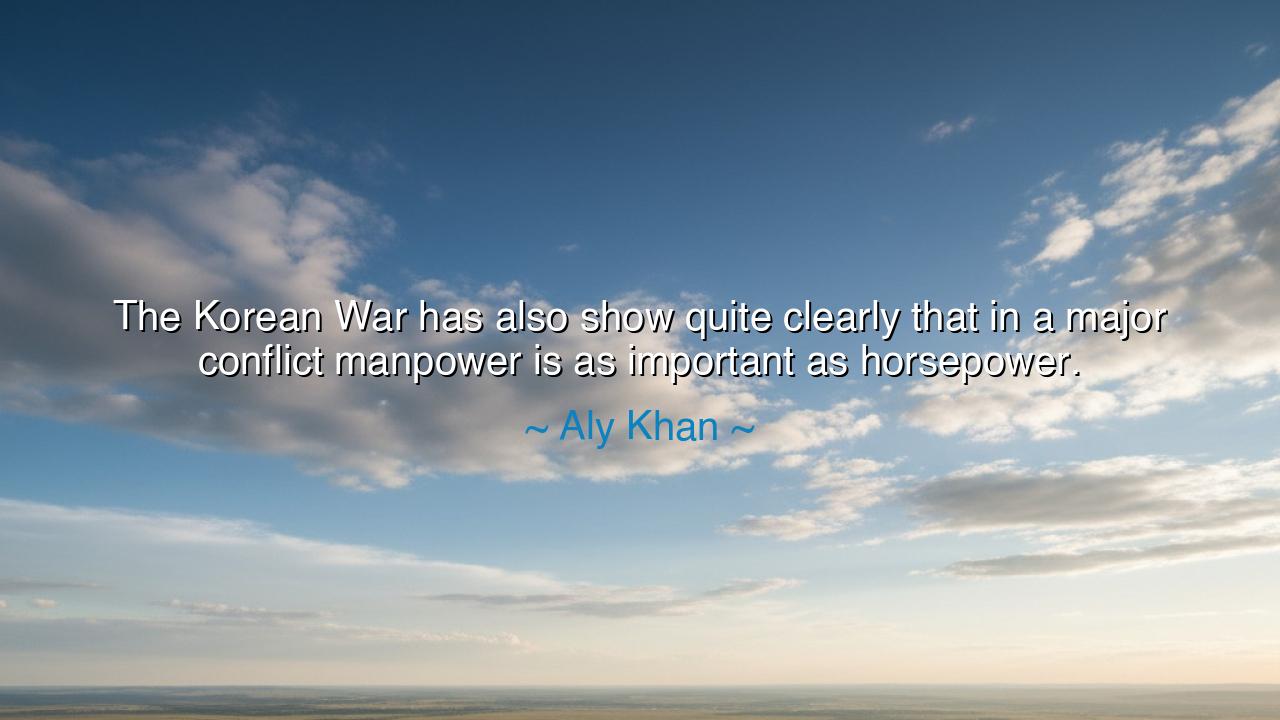
The Korean War has also show quite clearly that in a major
The Korean War has also show quite clearly that in a major conflict manpower is as important as horsepower.






Aly Khan, diplomat and soldier of the mid-twentieth century, once observed with piercing clarity: “The Korean War has also shown quite clearly that in a major conflict manpower is as important as horsepower.” These words, forged in the crucible of modern battle, carry with them a lesson that echoes across the ages. For though technology grows in power—tanks roar, planes thunder, engines scream—the heart of war, and indeed of all great struggles, remains the strength, endurance, and spirit of human beings. Machines may multiply force, but without the will and courage of men, they are but idle steel.
The origin of this saying lies in the early 1950s, when the world watched the Korean Peninsula erupt into a violent struggle between North and South, between communism and democracy, between East and West. It was a war that bore the marks of the new age: jet fighters, mechanized artillery, and armored divisions clashing across mountains and rivers. Yet Aly Khan, observing this conflict, recognized that victory did not belong to machines alone. The struggle was decided as much by the endurance of soldiers, the resolve of nations, and the sacrifices of common men and women as it was by horsepower, the engines of war.
The meaning of his words is profound: in every conflict—whether of arms, ideas, or daily life—technology and resources may serve as tools, but the decisive factor remains the human spirit. Manpower represents more than sheer numbers; it embodies discipline, unity, resilience, and the will to fight for a cause. No machine, however mighty, can replace the courage of those who hold the line, endure hardship, and give themselves wholly to the struggle. Aly Khan reminds us that the human heart is the true engine of history.
Consider the desperate early months of the Korean War. United Nations forces, though equipped with advanced weapons, were nearly driven into the sea by waves of determined North Korean and later Chinese soldiers. Against tanks and aircraft, they advanced with resolve, relying not on horsepower but on sheer manpower—the mass of human will. Though costly, their persistence forced the world to reckon with the truth Aly Khan expressed: that machinery, however powerful, cannot overcome a people bound together by determination.
History offers another lesson in the battle of Stalingrad during World War II. The German war machine, perhaps the most technologically advanced of its day, hurled itself against the Soviet city with tanks, artillery, and aircraft. Yet it was the manpower of Soviet soldiers and civilians—fighting street by street, enduring hunger and cold—that turned the tide. Stalingrad became the graveyard of Hitler’s ambitions, not because of horsepower, but because of the indomitable strength of human beings who refused to yield.
The lesson for us is clear: never overestimate the power of tools while underestimating the power of people. In your life, you may rely on technology, wealth, or position, but in the end, it is your character, discipline, and endurance that will decide victory. Machines may amplify effort, but it is the heart that sustains it. Nations fall when they forget that their greatest resource is not their weapons, but their people. Families falter when they forget that love and unity, not possessions, hold them together.
Practical wisdom calls for action: cultivate your own inner strength, for that is your true “manpower.” Do not depend solely on the horsepower of convenience, but build endurance through patience, courage through trial, and wisdom through reflection. In your communities, honor and uplift people above possessions, effort above ease. For in the struggles of life—as in war—what endures is not the might of machines, but the resilience of the human soul.
Thus, let Aly Khan’s teaching stand eternal: in every great conflict, manpower is as important as horsepower. Machines may roar and empires may boast of their engines, but the quiet strength of people—sacrificing, enduring, and striving together—remains the truest power under heaven. This is the lesson of Korea, of Stalingrad, of every age: the heart of man is the ultimate battlefield, and from it springs both the triumph and the tragedy of history.






TNTuyet Nguyen
As a reader, I find this quote emphasizes the dual nature of war: machines and people must work in tandem. The Korean War showcased that even superior machinery cannot succeed without sufficient, well-trained human forces to operate it and respond to dynamic conditions. Does this imply that future conflicts, despite automation, will still rely heavily on human contribution? It also raises questions about how to train and motivate personnel to maximize the effectiveness of technological advantages.
NMTran ngoc mai
This statement highlights a critical aspect of military strategy: hardware alone cannot secure victory. It makes me wonder about the implications for nations today, where technology has advanced dramatically. Are we at risk of underestimating the importance of human factors—morale, decision-making, endurance—in an era that increasingly prioritizes drones and AI-driven warfare? How can lessons from the Korean War inform contemporary defense planning and ethical considerations?
SLHuynh le sy luan
Reading this, I am struck by the timeless tension between resources and human commitment in war. Even with advanced tanks, aircraft, and artillery, a shortage of personnel can limit operational success. Could it be that the Korean War serves as a lesson not only in tactics but in valuing the human cost of conflict? How do modern militaries weigh manpower against increasingly automated systems without losing strategic effectiveness?
DDuong_2008
This quote makes me reflect on the balance between technology and human effort in warfare. While modern conflicts often emphasize advanced machinery, Aly Khan reminds us that soldiers—the human element—remain crucial. It raises a question: can superior technology ever fully compensate for a lack of manpower, or is human resilience and adaptability irreplaceable in major conflicts? How should military strategies balance these two forces effectively?